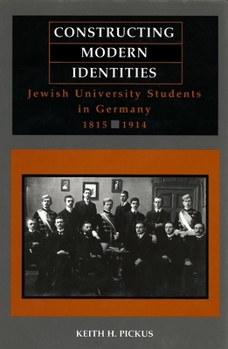Constructing Modern Identities: Jewish University Students in Germany, 1815-1914
Select Format
Select Condition 
Book Overview
The emergence of Jewish student associations in 1881 provided a forum for Jews to openly proclaim their religious heritage. By examining the lives and social dynamics of Jewish university students, Keith Pickus shows how German Jews rearranged their self-images and redefined what it meant to be Jewish. Not only did the identities crafted by these students enable them to actively participate in German society, they also left an indelible imprint...
Format:Paperback
Language:English
ISBN:081434352X
ISBN13:9780814343524
Release Date:December 2017
Publisher:Wayne State University Press
Length:222 Pages
Weight:0.67 lbs.
Dimensions:0.5" x 6.0" x 9.0"
Customer Reviews
2 ratings
Excellent monograph!!
Published by Thriftbooks.com User , 25 years ago
Keith Pickus Constructing Modern Identities: Jewish University Students in Germany 1815-1914 Wayne State University Press, 1999This work asserts that the identity and behavior of German-Jews throughout the nineteenth-century was not predicated merely on rising anti-Semitism, but was formed and reformed in response to the nature of the individual and his/her ever-changing social context. Inclusive in this social context was the anti-Semitic mood present in German society during this period; however, according to the author, such was not the exclusive determinant of German-Jewish identity. Through his meticulous investigation and analysis of Jewish university students in Germany, Keith Pickus has produced a monograph that convincingly demonstrates the identity of nineteenth-century German-Jews to be a dynamic, multidimensional, and diverse concept while simultaneously providing valuable insight into the professional study of social history. With this effort, Pickus, through well-documented statistical evidence and primary narratives, has taken the dominant one-dimensional analysis of Jewish identity in pre-modern Germany and expanded it to effect a more holistic and authentic portrait of a singular group forming personal identities which would allow them to function successfully within the predominant culture. Consequently, his work aptly reveals German-Jews of this era to have been active members of the larger German culture, not a single, disaffected out-group or merely hapless victims of German anti-Semitism. From this perspective, the Jews are shown as ingenious and distinctive in their cultural adaptations as all other subgroup in nineteenth-century German society, as vigorous, multidimensional, creative human beings.While his book sheds much needed light upon Jewish identity and behavior in nineteenth-century Germany, it certainly possesses a significant relevance for earnest endeavors in the field of social history. The most powerful statement in this work reads: "Avoiding teleological readings of history requires that we remain focused on the temporal and social context in which our historical actors perform." (170) This lone statement not only reveals the author's dedication, while soundly reinforcing his thesis, but also serves as an astute caveat for those who would mistakenly cast a narrow interpretation of past events or peoples by conceiving of them from an orientation tainted by their known future: in this case, attempting to analyze nineteenth-century German-Jewish identity with a view to the yet-to-come Holocaust. This well-written caveat is prudent advice to students and scholars alike and calls one to be ever cautious of such bias in his/her own historical studies. Pickus has done an excellent job in this effort, and his professional growth is witnessed throughout the book as his writing style, at times starchy, relaxes into an agreeable, even flow. The book is well-worth r
A well written, insightful book.
Published by Thriftbooks.com User , 25 years ago
Keith Pickus Constructing Modern Identities: Jewish University Students in Germany 1815-1914 Wayne State University Press, 1999 This work asserts that the identity and behavior of German-Jews throughout the nineteenth-century was not predicated merely on rising anti-Semitism, but was formed and reformed in response to the nature of the individual and his/her ever-changing social context. Inclusive in this social context was the anti-Semitic mood present in German society during this period; however, according to the author, such was not the exclusive determinant of German-Jewish identity. Through his meticulous investigation and analysis of Jewish university students in Germany, Keith Pickus has produced a monograph that convincingly demonstrates the identity of nineteenth-century German-Jews to be a dynamic, multidimensional, and diverse concept while simultaneously providing valuable insight into the professional study of social history. With this effort, Pickus, through well-documented statistical evidence and primary narratives, has taken the dominant one-dimensional analysis of Jewish identity in pre-modern Germany and expanded it to effect a more holistic and authentic portrait of a singular group forming personal identities which would allow them to function successfully within the predominant culture. Consequently, his work aptly reveals German-Jews of this era to have been active members of the larger German culture, not a single, disaffected out-group or merely hapless victims of German anti-Semitism. From this perspective, the Jews are shown as ingenious and distinctive in their cultural adaptations as all other subgroups in nineteenth-century German society, as vigorous, multidimensional, creative human beings. While his book sheds much needed light upon Jewish identity and behavior in nineteenth-century Germany, it certainly possesses a significant relevance for earnest endeavors in the field of social history. The most powerful statement in that we remain focused on the temporal and social context in which our historical actors perform."(170) This lone statement not only reveals the author's dedication, while soundly reinforcing his thesis, but also serves as an astute caveat for those who would mistakenly cast a narrow interpretation of past events or peoples by conceiving of them from an analyze nineteenth-century German-Jewish identity with a view to the yet-to-come Holocaust. This well-written caveat is prudent advice to students and scholars alike and calls one to be ever cautious of such bias in his/her own historical studies. Pickus has done an excellent job in this effort, and his professional growth is witnessed throughout the book as his writing style, at times starchy, relaxes into an agreeable, even flow. The book is well-worth reading for its singular insight into nineteenth-century German-Jewish identity as well as for its scrupulous treatment of






